41 spss value labels range
SPSS RANGE Function - Simple Tutorial with Examples SPSS ' RANGE function is used to evaluate whether or not values are within a given range. Test values equal to the lower or upper boundary are also within the given range. Run the syntax below for a quick demonstration. SPSS Range Syntax Example *1. Create couple of cases. data list free/v1 (f1). begin data 1 2 3 4 5 6 end data. *2. SPSS - Set Variable Labels with Syntax - SPSS tutorials SPSS Value Labels Syntax Examples (The test data used by the syntax below are found here .) *1. Apply single value label. Note how it appears under Variable View. value labels married 1 'Never married'. *2. Wrong way for adding/changing value labels. This removes the value label we added in the previous command. value labels married 2 'Married'.
Value Labels - SPSS - YouTube Using both the menu driven approach as well as syntax, I demonstrate how to create value labels for variables in SPSS.
Spss value labels range
Copy variable and value labels and SPSS-style missing value This function copies variable and value labels (including missing values) from one vector to another or from one data frame to another data frame. For data frame, labels are copied according to variable names, and only if variables are the same type in both data frames. Large Number of Value Labels - Fast Way - SPSS - YouTube I demonstrate an efficient way to add a large number of value labels to a variable in SPSS. Recoding Variables in SPSS Statistics - recoding data into two ... - Laerd How to recode variables in SPSS Statistics, specifically, recoding data into two categories. Login. ... Enter the value of "5" into the Range, ... from 8 to 16 also, so that the string labels are not truncated. Published with written permission from SPSS Statistics, IBM Corporation. Click on the button. Enter the value of "6" into the ...
Spss value labels range. PDF SPSS handout 3: Grouping and Recoding Variables - statstutor 2 Use step 5 described above to combine groups. (in our example Range 1 through 2 would become new value 1, 3 through 4 would become new value 2, and 6 through 8 would become new value 4. 2 To simply recode one group (e.g. here we would want group 5 to become group 3), under Old Value select Value and the old code. Under New Value select Value SPSS Tutorials: Frequency Tables - Kent State University In SPSS, the Frequencies procedure can produce summary measures for categorical variables in the form of frequency tables, bar charts, or pie charts. To run the Frequencies procedure, click Analyze > Descriptive Statistics > Frequencies. A Variable (s): The variables to produce Frequencies output for. Recoding Variables in SPSS Menus and Syntax - The Analysis Factor Old Value: Range: Lowest Through: 11. New Value: Value: 1. Click Add. ... I want to add the codes to spss as value lables and I also need to recode the existing data into 1,2,3,4,etc. ... you definitely want to use syntax to do both. The commands are RECODE and VALUE LABELS. If you look them up in the Command Syntax Reference manual. It's in ... SPSS Variable and Value Labels: A Quick Tutorial - Alchemer VALUE LABELS / var503 TO var504 0 'Unchecked' 1 'Checked' / var603 TO var605 1 "Couldn't care less" 2 'Somewhat devoted' 3 "Can't live w/o it!" Hint: I typically like leaving the period on its own line. This gives me a nice, clear, visual reminder of where my command stops running.
SPSS Class Notes: Modifying Data - University of California, Los Angeles in the Label column. In the Values column, click on the right of the box for schtyp to open the dialog box type 1 in the Value box and "public" in the Label box, and then click on Add. Do the for the next value label. * adding variable and value labels to schtyp. variable labels schtyp "the type of school the student attended.". How to Transform (Recode) Variables in SPSS - bizkapish This is the only difference so we will explain only "Recode into Different Variables" case. First, we choose column to recode (1) and we add it to pane (2). Next, we give name and label to the new column (3,4). After that, we click on the "Change" button (5) and name of the new column will be added to pane (6). How To Define Variables in SPSS - Easy SPSS Tutorial Label. Label allows you to choose the text that is displayed in any SPSS output. For example, if you give the Age variable a label "Age Status", then "Age Status" will appear on charts, graphs and tables. To add a label, click inside a cell within the Label column, and type in the value. Values Using Syntax to Assign 'Variable Labels' and 'Value Labels' in SPSS ... Here are the steps to assign value labels (in the same syntax window): Type the command "VALUE LABELS" (be careful of spelling). On the next line (new line not required, but recommended), type the name of the variable you want to assign a value labels to (in my example, the variable is "Example1"; see below). On the next line (new line not required, but recommended), type the number code that ...
Display Value Labels in SPSS - Easy SPSS Tutorial Quick Steps Click on tab to display Variable View Identify your variable, click on its cell in the Values column, and then click on the ellipsis Enter your first coded numerical value where it says Value, and the label you want associated with that value where it says Label Press Add, and then repeat for all further numerical values Variable Labels and Value Labels in SPSS - The Analysis Factor But by having Value Labels, your data and output still give you the meaningful values. Once again, SPSS makes it easy for you. 1. If you'd rather see Male and Female in the data set than 0 and 1, go to View->Value Labels. 2. Like Variable Labels, you can get Value Labels on output, along with the actual values. Just go to Edit->Options. SPSS Value and Labels - javatpoint SPSS Value and Labels In this section, we will learn the Values option. Values are used to indicate the Labels of variables. For example, if we have Gender as a variable, Gender has male and female labels. Value labels - IBM Value labels can be up to 120 bytes. To specify value labels Parent topic: Variable View Related information To specify value labels To display or define variable attributes Variable names Variable measurement level Variable type Input versus display formats Variable labels Missing values Column width Variable alignment
Labeling and documenting data | SPSS Learning Modules You can use SPSS keywords such as lowest, lo, hi, highest and thru in specifying a range. You can use the sysfile info command, the display dictionary or the display labels command to see that the missing values were properly assigned. Because the missing values command is used to assign user-defined missing values, you cannot use a period (.).
How to show the numeric values of categorical labels in output using ... In SPSS you can choose in the settings wether label, the numerical values or both are shown in the output tables. GUI In the Menu choose Edit->Options and then the Output tab. There you can change the output settings under Pivot Table Labeling. Syntax Within Syntax Editor you can define the output settings with the "SET TNUMBERS" command.
The Values Column of the SPSS Variable View Tab - dummies Normally, you make one entry for each possible value that a variable can assume. For example, for a variable named Sex you could have the value 1 assigned the label "Male" and 2 assigned the label "Female." Or, for a variable named Committed you could have 0 for "No," 1 for "Yes," and 2 for "Undecided." If you have labels defined, when SPSS displays output, it can show the labels instead of ...
val_lab: Set or get value labels in expss: Tables, Labels and Some ... In expss: Tables, Labels and Some Useful Functions from Spreadsheets and 'SPSS' Statistics. Description Usage Arguments Details Value Examples. View source: R/labels.R. Description. These functions set/get/drop value labels. Duplicated values are not allowed. If argument x is data.frame or list then labels applied to all elements of data.frame/list. To drop value labels, use val_lab(var ...
Recoding Variables in SPSS Statistics - recoding a given range - Laerd Recode a given range in SPSS Statistics. Example: The data given below represents the scores of 10 students in a final examination. Recode the data giving code "1" to scores between 75 - 100, code 2 to scores between 61 - 74, code 3 to scores between 41 - 60 and code 4 to scores between 0 - 40. Final examination scores of 10 students. Scores. 58.
SPSS/Python - Accessing variable labels - Stack Overflow I am trying to access variable labels in for loop in SPSS using Python. The for loop iterates over a range of variables, deleting 1-3 and renaming 4 and 5 in a sequence of 5 variables. This works fine, but now when trying to access the variable labels via SPSS I am running into the 'unicode object has no attribute keyes' error.
Labelled vectors for SPSS — labelled_spss • haven - Tidyverse It is similar to the labelled () class but it also models SPSS's user-defined missings, which can be up to three distinct values, or for numeric vectors a range. Usage labelled_spss( x = double (), labels = NULL, na_values = NULL, na_range = NULL, label = NULL ) Arguments x A vector to label. Must be either numeric (integer or double) or character.
Overview (VALUE LABELS command) - IBM Each value label can be up to 120 bytes long. The same labels can be assigned to the values of different variables by specifying a list of variable names. For string variables, the variables specified must be of equal length. Multiple sets of variable names and value labels can be specified on one VALUE LABELS command as long as the sets are ...
Group data and define corresponding value labels | Raynald's SPSS Tools * To group values and define value labels for the grouped values. * for instance define labels for age 1="0 ... this macro. * vname =name of variable to be recoded. * vcoded =name of variable which is to contain recoded value. * begr =BEGinning of first Range. * endr =ENDing of first Range (4 means 4.9999999...). * diff =display the endr as ...
SPSS Tutorials: Defining Variables - Kent State University The Value Labels window appears. Type the first possible value (1) for your variable in the Value field. In the Label field type the label exactly as you want it to display (e.g., "Freshman"). Click Add when you are finished defining the value and label. Your variable value and label will appear in the center box.
Recoding Variables in SPSS Statistics - recoding data into two ... - Laerd How to recode variables in SPSS Statistics, specifically, recoding data into two categories. Login. ... Enter the value of "5" into the Range, ... from 8 to 16 also, so that the string labels are not truncated. Published with written permission from SPSS Statistics, IBM Corporation. Click on the button. Enter the value of "6" into the ...
Large Number of Value Labels - Fast Way - SPSS - YouTube I demonstrate an efficient way to add a large number of value labels to a variable in SPSS.
Copy variable and value labels and SPSS-style missing value This function copies variable and value labels (including missing values) from one vector to another or from one data frame to another data frame. For data frame, labels are copied according to variable names, and only if variables are the same type in both data frames.




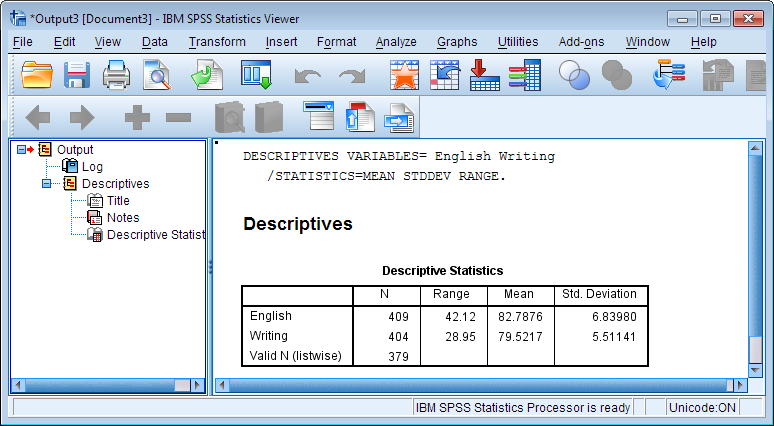
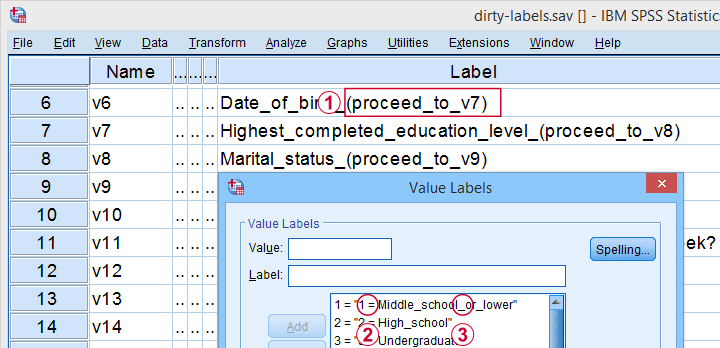
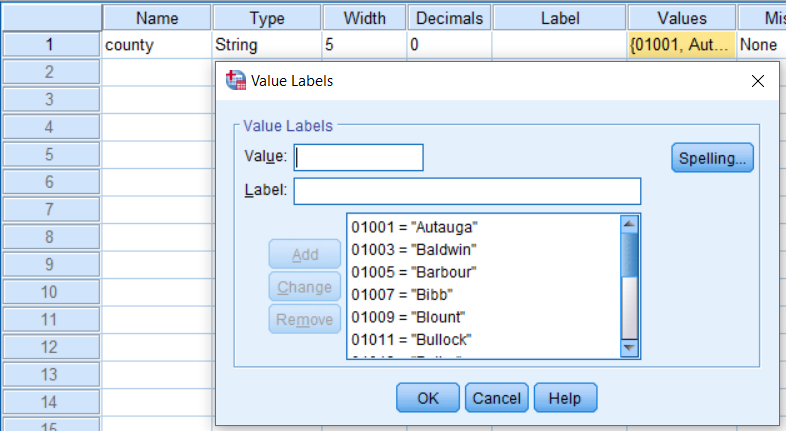


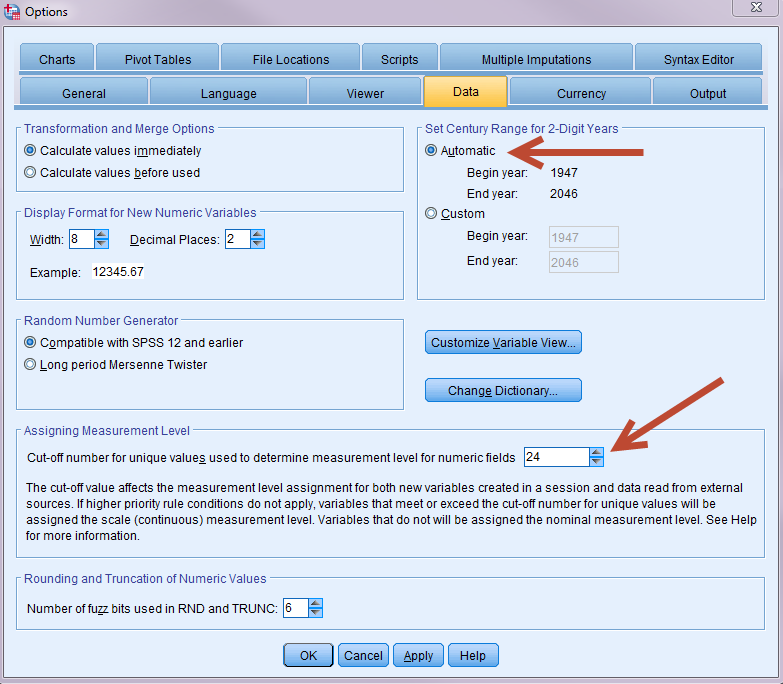



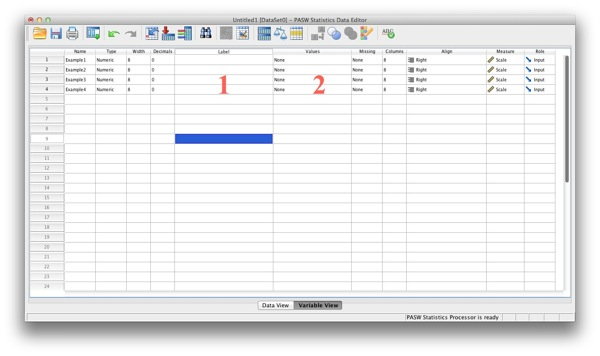

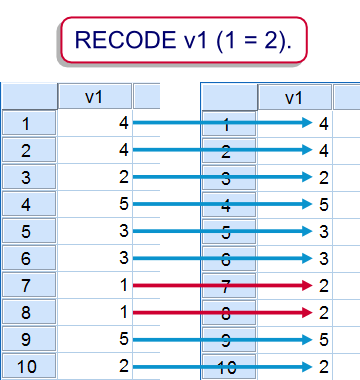



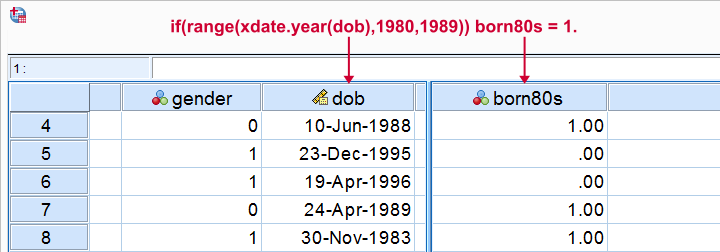
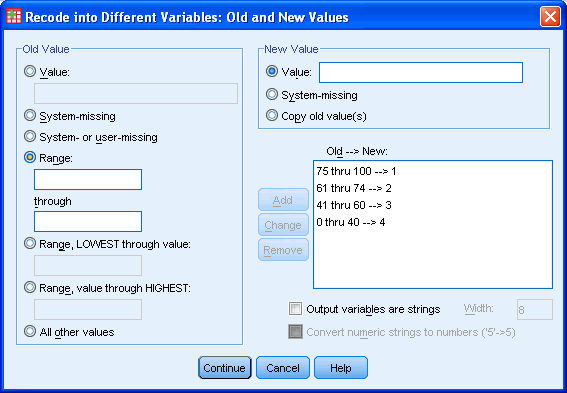
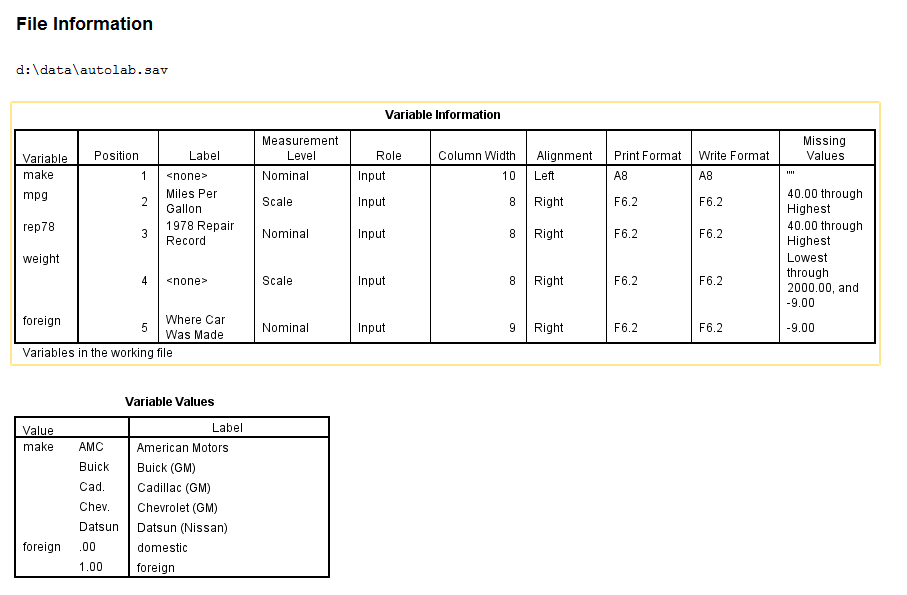
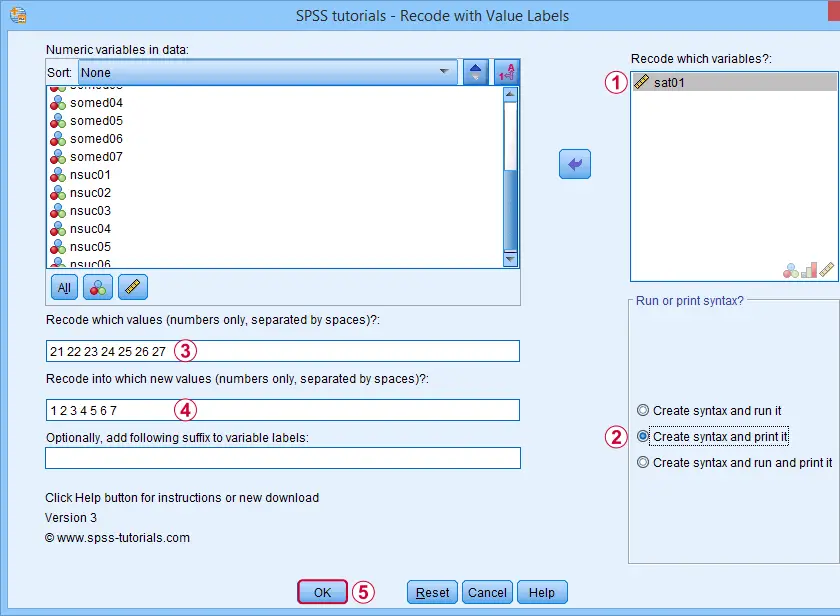
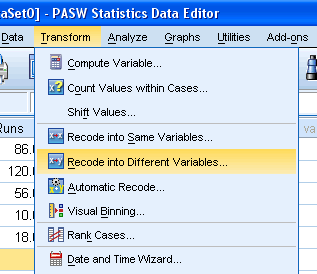

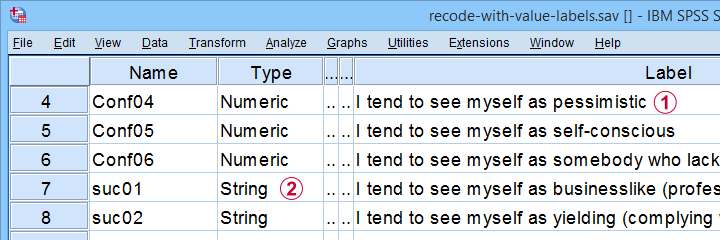

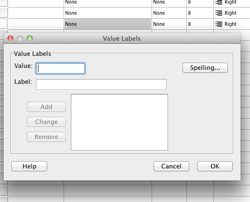
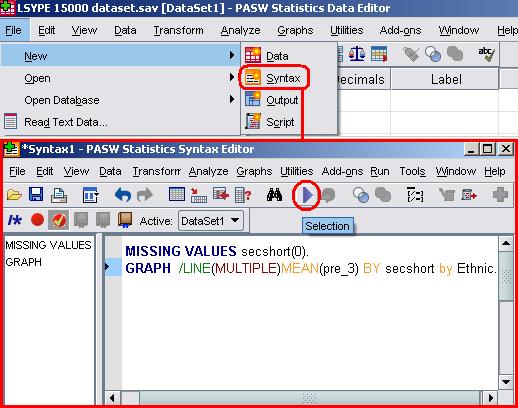

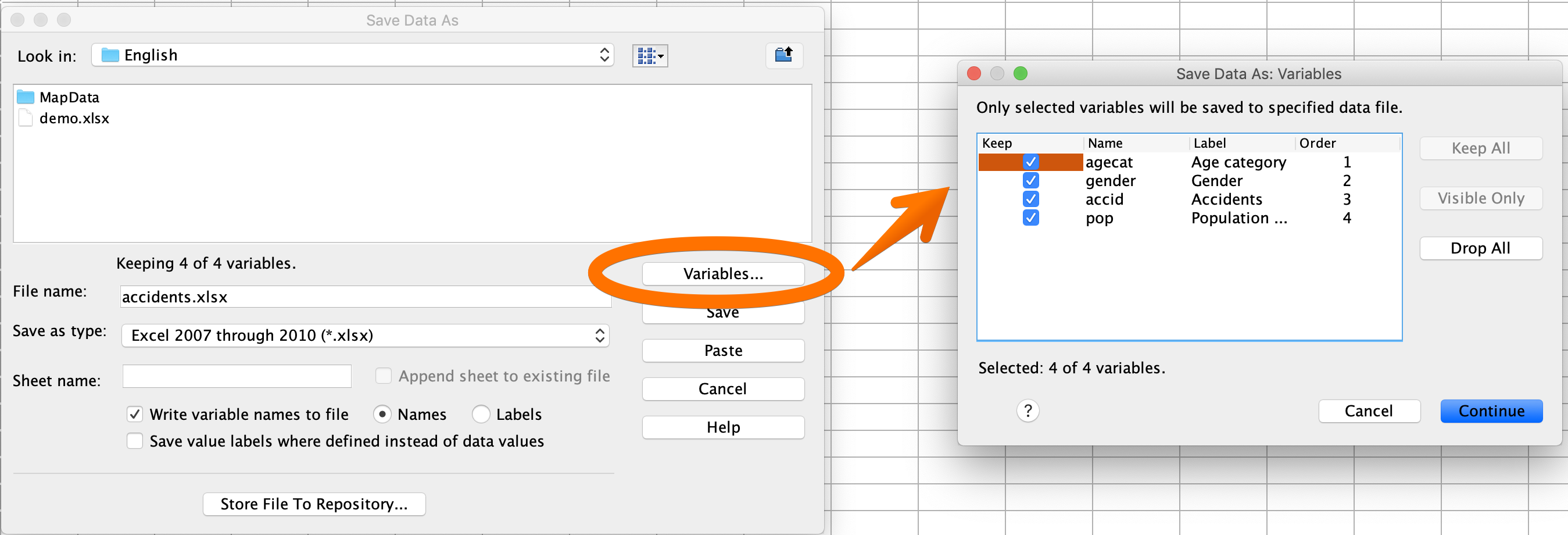
![Solved [2+1 = 3 marks] Question No. 4 a) Use the SPSS | Chegg.com](https://media.cheggcdn.com/study/c1b/c1bd940b-4886-42e7-867e-7666f928e0eb/image)
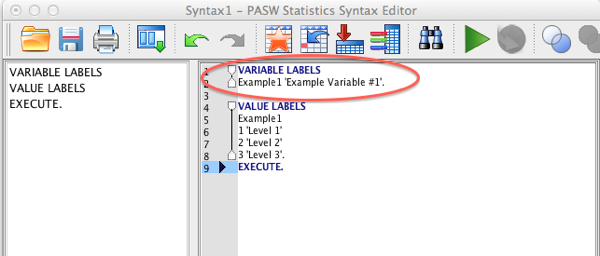
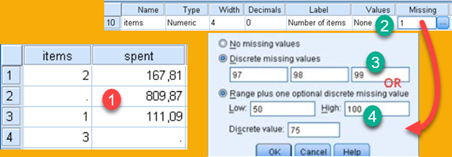

Post a Comment for "41 spss value labels range"